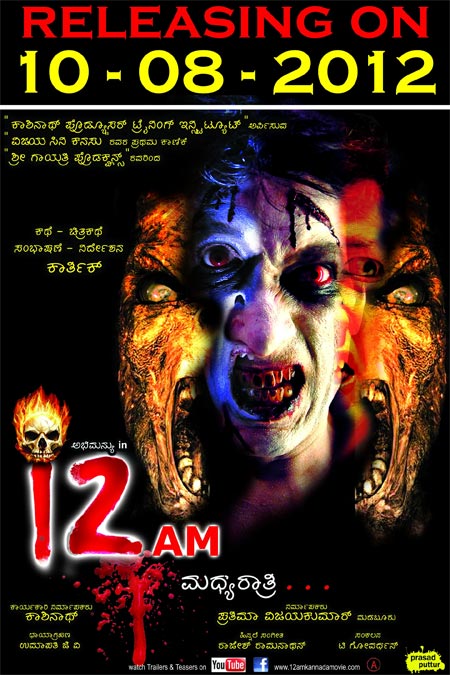 | « Back to article | Print this article |
'I have never undergone any directorial training'
Kashinath, the popular Kannada actor and film-maker of the 1980s is considered a trend-setter for his unconventional looks, style of making films, and dialogue delivery. His films touched on subjects that were considered taboo and vulgar in Indian society of that time.
Among the 16 films he acted in, produced, or directed, were popular films such as Anubhava, Ananthana Avanthara, Ajagajanthara, Aparajita and Hendathi Andre Hegirabeku.
Kashinath had an exceptional eye for tapping raw talent and among his disciples in the Kannada film industry are Upendra, V Manohar and Sunil Kumar Desai.
Kashinath has now opened his own training school and has christened it Kashinath Producers' Training Institute.
The institute has executed a live film project, 12 am Midnight, that is releasing this Friday. The actor-filmmaker has taken on the role of an executive producer for the film besides acting in it.
In this interview with Srikanth Srinivasa, Kashinath talks about the new business model of film-making and the content of the film.
What is 12 am Midnight all about?
It is a horror film with a comical touch and a suspense thriller. The film is about an incident that occurs at midnight in a medical college.
The movie turns the spotlight on whether ghosts exist or not, given the fact that there are so many dead bodies in the medical college.
'People without knowledge of direction became directors overnight'
What is your role in the film?
I play a lecturer's role. Apart from that, I am the executive producer. I have helped the producer from the beginning (storyboard stage) till the end.
Why is it titled 12 am Midnight?
There lies the element of curiosity. After 11 pm it is 12 midnight. A majority of people say 12 pm in the afternoon when it is 12 noon.
We thought why not title our film '12 am' because it is 12.01 am after midnight.
Why have you started this producers' training institute?
Whenever there is an investment in any industry, there should be outgo of funds.
There was an investment of Rs 200 crore in the Kannada film business a few years ago following the success of a few films made by youngsters. But there was no return on investments nor was there any turnover.
Producers vanished from the scene after making a film. I felt that the industry is heading in the wrong direction.
If a person managed to 'catch' a producer, then he would himself become a director. People without knowledge of direction or films became directors overnight.
There were a lot of financial assumptions made by these 'enterprising' people regarding territories and television rights.
People approached me during this boom period and I told them straight "if you cannot release the film don't do it!"
'Producers should not spend excessively'
Who encouraged you with this idea of training the producers?
Some people in the industry and media persons were encouraging.I thought producers need to develop a taste for cinema.
It is all about practical execution of a project; there is no theory whatsoever. When some producers approached me to do a film I mooted this proposal.
It is not enough for a producer to invest money and then forget about the movie. He should know what he is doing.
Will this model be without risks?
I have been telling producers and film-makers that we are creating only an illusion. If people are willing to pay a price, there is a value, otherwise it is an illusion.
All that is required is a sincere effort. The producer should know the intent of the film and decide the genre of film that he is planning to make or is ready to produce.
We start thinking backwards. We think from the audiences' points of view who buy tickets to see the movie. Producers should not spend excessively.
'Publicity should commence a month before the release of the film'
What training will the institute impart?
Successful movies will be analysed. When there is a budget limitation, there is a lot of paper work involved. A film-maker should be able to see the film on paper and that will give the exact timing so that the money is well spent.
What are the different stages of cinema making?
The story forms the skeleton and then we add muscle and colour to it and that forms the screenplay. A shooting script is then readied before we go on to the shooting floor.
All the other details are then worked out according to the producer's budget, such as casting, locations, properties, sets, junior artistes, dancers et al.
When we go on the shooting floor, there is division of work. There are bound to be practical problems involving the artistes and their dates. I always tell the team to finish the shooting work at one go as far as possible because that is a major source of expenditure that requires good execution.
Producers should not unnecessarily spend money on muhurtas and poojas because it involves extravagant spending.
Publicity should commence a month before the release and only after shooting is done.
I guide the producers on all these nuances. A film is edited before the dubbing but if there are doubts, the dubbing can be taken up later. The other procedures in the post-production stage are then taken up.
'I concentrated solely on subjects and not on heroism'
How does it feel when you see your disciples come into their own and become so famous?
I encourage individuality in every person. At some point in time, they mention that they worked with me, which is enough for me.
I am happy for all those who are doing well. We take their help and they are also trained to move ahead.
Was it a deliberate effort on your part to make socially relevant films?
Yes. I wanted to become a scientist. My ambition and goal was to go to the US where my uncle lived and worked as a scientist. I did my bachelor's in science after scoring well in my pre-university exams. Basically, I have a scientific temperament and I think logically.
When I started becoming active in theatre activities during my undergraduate days, my ambitions and goals changed.
I wanted to break the format in film-making. I started with a comedy film, Apuroopada Athithigalu, and then took up an experimental film Aparajita. Both films clicked.
I have never ever undergone any directorial training. I have also never worked as an assistant to anyone. I studied cinema books and got into film-making.
Why did you project yourself differently in your films when you were known to be a serious film-maker?
My films had a social undercurrent. They carried social messages in an entertaining way. I used to base all my films on the Panchatantra, which is interesting, comical, but has a message.
There is a difference between the comedies of Laurel & Hardy and Charlie Chaplin. I am deeply influenced by Charlie Chaplin's films. He had something deeper to convey through his comedy, whereas you could laugh and just forget after seeing Laurel & Hardy films.
I wanted the audiences to laugh and at the same time to feel that this has happened in their neighbourhood.
I concentrated solely on subjects and not on heroism.
'I want to create a forum for film-making'
What has been your influence on the making of 12 am Midnight?
Cinema is a commerce-based art. I want to create a forum for film-making. I want some good producers to survive and to have a pool of good producers.
I wanted the director to be independent. I did not interfere with the functioning of the film's director. I only gave my suggestions. The director is the head cook and the decision-maker.
I used my experience to cut down unwanted expenditure and suggested alternatives to bring down expenses.
What is your take on corporatisation of films?
Corporate involvement in film-making pertains only to funding and at the distribution stage. At the scripting stage, the involvement of corporate houses does not work.
If a film-maker wants to take a longer time to make the film, he must be given the freedom to complete his vision. He cannot be dictated to by the financier because the picture will not get completed without what the director wants.





